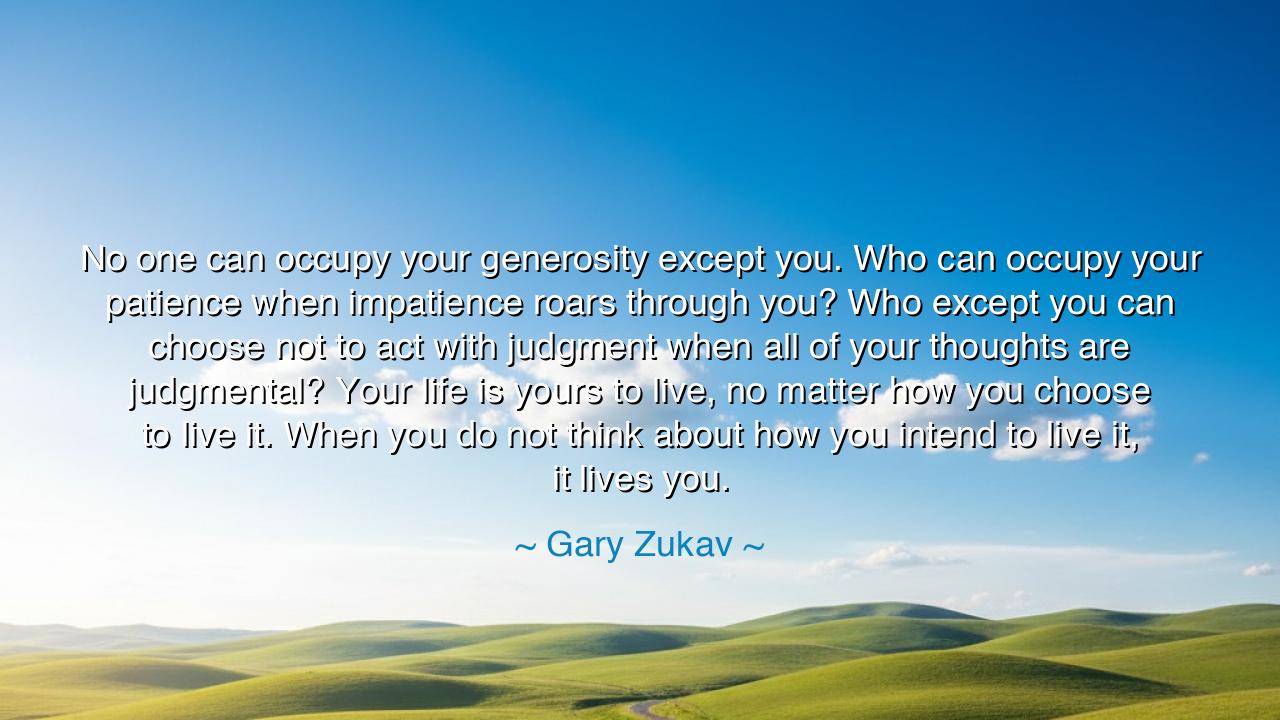
No one can occupy your generosity except you. Who can occupy
No one can occupy your generosity except you. Who can occupy your patience when impatience roars through you? Who except you can choose not to act with judgment when all of your thoughts are judgmental? Your life is yours to live, no matter how you choose to live it. When you do not think about how you intend to live it, it lives you.






Hear, O children of the soul, the words of Gary Zukav, who spake with piercing clarity: “No one can occupy your generosity except you. Who can occupy your patience when impatience roars through you? Who except you can choose not to act with judgment when all of your thoughts are judgmental? Your life is yours to live, no matter how you choose to live it. When you do not think about how you intend to live it, it lives you.” In this saying lies a mirror for every heart, for it remindeth us that no other hand can steer the vessel of our being. We are sovereign over our inner kingdom, though many forget and surrender it to storm and shadow.
Mark well this teaching: generosity, patience, and judgment are not garments lent by others, but treasures hidden within the soul. No man may seize them from thee; no woman may impose them upon thee. They are thine alone to wield or to abandon. When anger riseth like fire, it is thou, and thou alone, who chooseth whether to pour oil upon the flames or water. When the mind is filled with judgments, it is thy decision to let them rule or to set them aside in mercy. This is the essence of freedom—not the outer chains that bind or break, but the mastery of one’s inner self.
Consider the tale of Viktor Frankl, the physician cast into the darkness of the concentration camps. Stripped of every possession, torn from his family, bound by the cruelest fate, he yet declared that one freedom remained: the power to choose his response. “Everything can be taken from a man but one thing,” he said, “the last of the human freedoms—to choose one’s attitude in any given set of circumstances.” Even in torment, he guarded his patience, his generosity, his inner sovereignty. This is the truth of Zukav’s words: thy life remaineth thine, even when the world seeketh to claim it.
Beware, O seekers, of living without intention. For Zukav warneth: “When you do not think about how you intend to live it, it lives you.” A river unguided may flow into swamps; a fire untended may consume the village. So too a life without purpose drifts into habit, fear, and the will of others. To live unconsciously is to be lived by the forces around thee—thy cravings, thy judgments, the noise of the world. But to live with intention is to seize the rudder and guide thy vessel, even through stormy seas.
Yet, do not mistake intention for rigidity. For just as the archer adjusteth his aim when the wind shifteth, so must thou adjust the course of thy days with wisdom. To be sovereign over thy life is not to control all things, but to meet each moment with presence, choosing thy response with awareness. Even when impatience roars, thou canst breathe and answer with stillness. Even when judgment clouds the mind, thou canst summon compassion. This is the mastery of the self, the noblest victory a human soul may win.
The lesson is clear: no one can live thy life for thee. Others may counsel, command, or condemn, but the choosing is always thine. Choose to be generous when the world is mean. Choose to be patient when all within thee cries for haste. Choose mercy when thy thoughts hunger for judgment. In these choices lieth freedom. In these choices lieth the shaping of thy destiny.
Practical is this counsel: each day, awaken and ask thyself, “How shall I live today? What shall I bring forth—anger or compassion, fear or courage?” Write thy intentions as the farmer soweth seeds. When thou art tempted by haste, pause and breathe. When thou art tempted by judgment, speak instead with kindness. Practice these things not once, but daily, for they are the labors of a lifetime.
Thus remember: “Your life is yours to live.” Guard it with wisdom. Fill it with intention. Let not the world or thy unchecked impulses live it for thee. For the greatest tragedy is not death, but a life unlived; and the greatest triumph is to stand at the end of thy days and know: I chose. I lived. I was the master of my soul.






AAdministratorAdministrator
Welcome, honored guests. Please leave a comment, we will respond soon